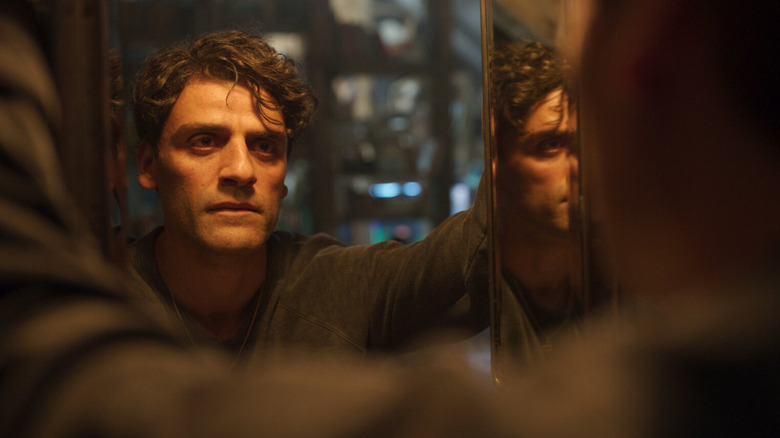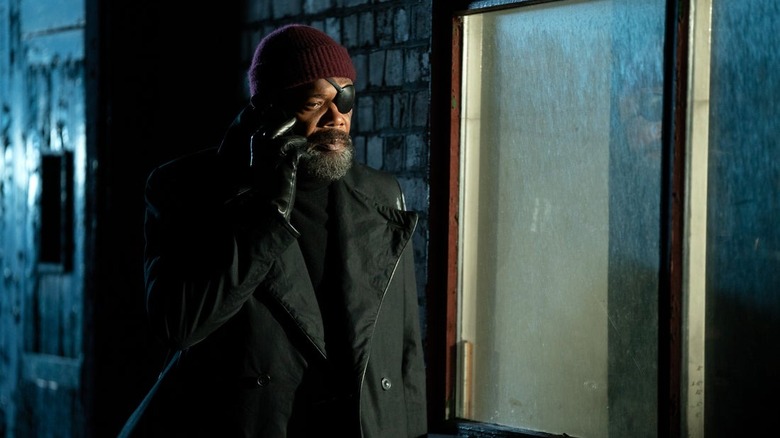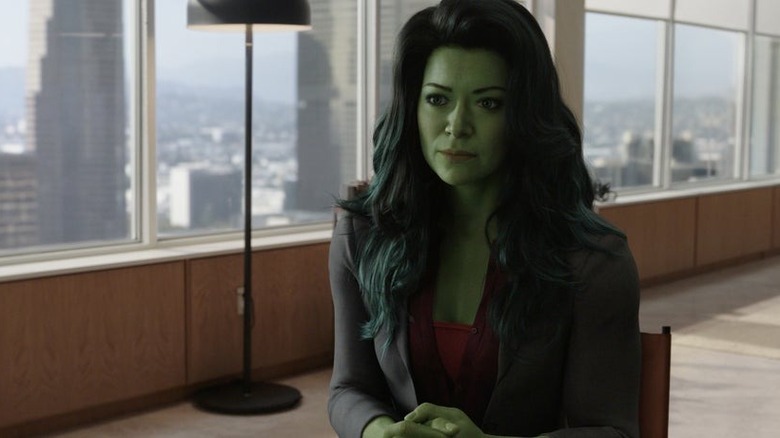Marvel's Disastrous TV Production Pipeline Should Be A Lesson For Hollywood
When Marvel Television, the team that made shows like "Daredevil," "Agents of S.H.I.E.L.D.", and "Inhumans," was disbanded in 2019 and the film executives from Marvel Studios firmly took the reins of the company's promising slate of TV shows about to hit Disney+, the reaction from comic book fans was a sigh of relief. Finally, all Marvel projects would be directly overseen by Kevin Feige and his team, which, given their track record in movies up to that point, should ensure a level of consistent quality across the board.
That was the dream. But that dream died surprisingly quickly.
"WandaVision" started strong and sputtered in its climax. "The Falcon and the Winter Soldier" touched on a few interesting ideas, but got too bogged down with things like the "Power Broker." There were a few bright spots in the shows that followed. "Loki" season 1 and "Ms. Marvel" are the best seasons of TV Marvel Studios has made so far, while smaller highlights (like the casting of Hailee Steinfeld as Kate Bishop in "Hawkeye") seemed poised to pay off in a murky way down the line, either in a film or another show. After the peak of "Avengers: Endgame," it didn't take long for the Marvel Disney+ shows to develop something of a rocky reputation overall — one that hit a critical and cultural crater with this past summer's "Secret Invasion."
So what happened? Why was the studio that released an unprecedented string of box office behemoths so flummoxed by applying that strategy to the small screen? It turns out their entire approach was seriously flawed — so much so, the studio is undergoing a massive overhaul in the way it'll be developing shows moving forward.
We can only hope other companies in Hollywood haven't already incorporated those now-shredded pages from the Marvel playbook into their own practices.
Marvel tried to retain control at all costs
Starting with "WandaVision," Marvel Studios made it clear it was not going to follow the traditional, tried-and-true methods of making television, which had worked for decades. Instead of a showrunner — an executive producer and writer who shapes the creative vision of a series and sees it through from inception to completion, sitting at the top of the creative food chain for an individual show — Marvel opted to hire what it referred to as "head writers," a term that disturbed veteran TV writers as soon as it was adopted. Under Marvel's method, the buck stopped with Kevin Feige and his film execs, who limited the power of "head writers" in an attempt to more tightly control the final product. "TV is a writer-driven medium," one Marvel insider told The Hollywood Reporter. "Marvel is a Marvel-driven medium."
That process has resulted in some unfortunate behind the scenes situations. "Moon Knight" creator and writer Jeremy Slater reportedly quit, and director Mohamed Diab was given control of the series in his wake. THR says "Secret Invasion" creator Kyle Bradstreet had been writing the scripts for the show for around a year "when he was fired after Marvel decided on a different direction" for the show. A significant portion of the show's crew was replaced as well, including crucial positions like line producers, unit production managers, and assistant directors.
Jessica Gao, who developed and wrote "She-Hulk: Attorney at Law," was apparently "sidelined" in favor of that show's director, Kat Coiro. Gao was eventually brought back to help with post-production, which appears to have been a eureka moment for Marvel Studios: THR says the company now plans to hire and embrace showrunners, because "Gao's postproduction work on 'She-Hulk' helped Marvel see that it would be helpful for its shows to have a creative throughline from start to finish."
Marvel also has plans to hire devoted TV executives to be a part of its process moving forward rather than relying on film executives to step into that role. "We need executives that are dedicated to this medium, that are going to focus on streaming, focus on television," Marvel Studios film exec Brad Winderbaum told THR, "because they are two different forms."
With a level of hubris normally reserved for comic book supervillians, a company known for its innovation in the theatrical space was so convinced of its own brilliance that it tried to force an entirely different medium to conform to its methods. Unlike most supervillains, though, at least Marvel seems to acknowledge its approach isn't working and is changing course.
Dear Hollywood, don't make the same mistake twice
As the Marvel Cinematic Universe was becoming a cultural juggernaut on the big screen, with its interconnected latticework of storytelling, rivals did what movie studios have been doing since their inception: They tried to chase what's popular and replicate it. Naturally, that was easier said than done. Just look at the soon-to-be-extinct DC Extended Universe, or the corpse of Universal's embarrassing cart-before-the-horse plans for its so-called Dark Universe, which were fully abandoned after literally one movie didn't live up to expectations.
Marvel Studios' failure in streaming should send a clear signal to the rest of the industry: Just because the existing Marvel Disney+ shows are some of the most-watched series on the streamer doesn't mean the methodology behind them was sound or worthy of replication. We've lived through an era in which long-held industry practices are rightfully being examined and questioned, and barriers are being knocked down to allow for a more diverse set of creators to tell stories. But this era has also contained example after example of start-up companies upending entire business models, only for the new version to ultimately prove to be worse than what came before it. I'm not saying things were always better in the good old days, or that there isn't more room for improvement, but sometimes, tried-and-true methodologies work for a reason.
Marvel's gargantuan success in the film world put dollar signs in studio executives' eyes, and in some ways, the chase to capture a piece of that glory is still on. Here's hoping the studio's excursion into the streaming world doesn't inspire that same level of mimicry in terms of the methodology of how to actually make television.


